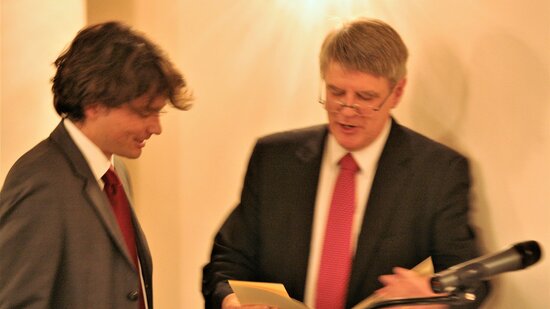 Prizes
Prizes

Recent awards
Prize of the German Historical Institute London 2024
We are delighted to announce that the joint winners of the 2024 Prize of the German Historical Institute London are:
Dr. phil. Agnes Piekacz (Bielefeld University)
Contested Commoditisation. The British–South African Second-hand Military Clothing Trade, c.1870–1910.
Dr Rory Hanna (University of Sheffield)
Student Protest and Activism in West Germany, 1949–1965. Political Conflict, Academic Citizenship, and the Changing Campus.
Prize of the German Historical Institute London

The Prize of the German Historical Institute London is awarded annually for an outstanding Ph.D. thesis on
- German history (submitted to a British or Irish university),
- British history or British colonial history (submitted to a German university),
- British-German relations or British-German comparative history (submitted to a British, Irish, or German university).
The Prize is 1,000 Euros and will be presented on the occasion of the GHIL’s Annual Lecture in November 2025.
To be eligible, applicants must have successfully completed doctoral exams and vivas between 1 August 2024 and 31 July 2025.
Application Details
To apply, send one copy of the thesis with
- a one-page abstract
- examiners’ reports on the thesis
- a brief CV
- a declaration that the work will not be published before the judges have reached a final decision
- a supervisor’s reference
to reach the Director of the German Historical Institute London, 17 Bloomsbury Square, London WC1A 2NJ, by 31 July 2025. Applications and theses should be sent by email as a PDF attachment to: prize@ghil.ac.uk.
If the prize-winning thesis is on British history, British colonial history, British-German relations or British-German comparative history it may also be considered for publication in one of the Institute's publication series.
Previous prize-winners
| 2023 | Thiago Pinto Barbosa for Science and Human Difference in Germany and India: The Production and Circulation of Anthropological Knowledge in Irawati Karve’s Work and Legacy |
| 2022 | Annalisa Martin for Managing Commercial Sex in West Germany, 1950s–1980s |
| 2021 | Anita Klingler for Negotiating Violence: Public Discourses about Political Violence in Interwar Britain and Germany Jonathan Triffitt for Twilight of the princes: The fall and afterlife of monarchy in southern Germany, 1918-1934 (joint winners) |
| 2020 | Jörg-Ole Münch for Multikultureller Tumult: Gruppenbildung um den Londoner Altkleidermarkt in der ersten Hälfte des 19. Jh (awarded as the Wolfgang J. Mommsen Prize) |
| 2019 | Jan Lambertz for Early Post-War Holocaust Knowledge and Jewish Missing Persons |
| 2018 | Arun Kumar for Learning to Dream: Education, Aspiration, and Working Lives in Colonial India (1880s–1940s) |
| 2017 | Simon Mee for Monetary Mythology: The West German Central Bank and Historical Narratives, 1948–78 Marcel Thomas for Local Lives, Parallel Histories: Villagers and Everyday Life in the Divided Germany (joint winners) |
| 2016 | Benjamin Pope for Relationships between Townspeople and Rural Nobles in late Medieval Germany: A Study of Nuremberg in the 1440s |
| 2015 | Mahon Murphy for Prisoners of War and Civilian Internees Captured by British and Dominion Forces from the German Colonies during the First World War, submitted to the London School of Economics |
| 2014 | Chris Knowles for Winning the Peace: The British in Occupied Germany, 1945–1948, submitted to King's College London |
| 2013 | Helen Whatmore for On Co-Existence with a KZ: Bystanders and Concentration Camps in Western Europe 1938–2005, submitted to University College London |
| 2011 | David Motadel for Germany’s Policy towards Islam, 1941–1945, submitted to the University of Cambridge |
| 2010 | Britta Schilling for Memory, Myth, and Material Culture: Visions of Empire in Postcolonial Germany, submitted to the University of Oxford |
| 2009 | Jana Tschurenev for Imperial Experiments in Education: Monitorial Schooling in India, 1785–1835, submitted to the Humboldt-Universität Berlin |
| 2008 | Christiane Reinecke for Grenzen der Freizügigkeit: Die Politik der Migrationskontrolle in Großbritannien und Deutschland, 1880–1930, submitted to the Humboldt-Universität Berlin |
| 2007 | Astrid Swenson for Conceptualising Heritage in 19th- and Early 20th-Century France, Germany and England, submitted to the University of Cambridge |
| 2006 | Michael Ledger-Lomas for The Idea of Germany in Religious, Educational and Cultural Thought in England, c.1830–1865, submitted to the University of Cambridge |
| 2005 | Florian Altenhöner for Kommunikation und Kontrolle: Gerüchte und städtische Öffentlichkeiten in Berlin und London 1914–1918, submitted to the Humboldt-Universität Berlin |
| 2004 | Christian Haase for In Search of a European Settlement: The Königswinter Conference and West Germany – Allied Relations 1939–1973, submitted to the University of Oxford |
| 2003 | Kristin Anne Semmens for Domestic Tourism in the Third Reich, submitted to the University of Cambridge |
| 2002 | Jan Rüger for Celebration of the Fleet in Britain and Germany, 1897–1914, submitted to the University of Cambridge |
| 2001 | Ulrike Lindner for Politik – Gesundheitswesen – Patienten: Maßnahmen und Auswirkungen von Gesundheitspolitik in der Bundesrepublik Deutschland und in Großbritannien 1948–65, submitted to the LMU Munich |
| 2000 | Nikolaus Braun for Brudermord, Rebellion, Freiheitskrieg? Legitimieren und Handeln im Irischen Bürgerkrieg 1922–1923, submitted to the University of Munich |
| 1998 | Jörn Leonard for Sprachmengerei und Begriffsverwirrung: Komparative Studien zur historischen Semantik von "Liberalismus" im 19. Jahrhundert. Frankreich, Deutschland, Italien und England im Vergleich, submitted to the University of Heidelberg |
| 1997 | Lothar Reinermann for Der Kaiser in England: Perzeption und Image Wilhelms II. in der britischen Öffentlichkeit 1888–1920/1, submitted to the University of Duisburg |
| 1996 | Martin Schaad for Anglo-German Relations during the Formative Years of the European Community, 1955–1961 |
Wolfgang J. Mommsen Prize

In 2010, the German Historical Institute London awarded the Wolfgang J. Mommsen Prize for the first time on the occasion of its Annual Lecture. The Wolfgang J. Mommsen Prize is named in memory of the former director of the German Historical Institute London, who died in 2004. Wolfgang J. Mommsen would have celebrated his eightieth birthday that year.
The prize will be awarded to the author of an outstanding piece of German research on British history and covers the cost of translating the work into English and publishing it in the Institute's series Studies in British and Imperial History. The aim of the series is to make German research on British history more accessible to a British readership. Both the prize and the series thus further the Institute’s mission of advancing British–German research in the field of history.
Previous prize-winners
The 2020 winner was Ole Münch, who received his award for his Ph.D. thesis Multikultureller Tumult: Gruppenbildung um den Londoner Altkleidermarkt in der ersten Hälfte des 19. Jh, submitted to the University of Konstanz, and published in German as Cutler Street Market: Interkultureller Austausch im Londoner East End 1780-1850, Moderne Zeit: Neue Forschungen zur Gesellschafts- und Kulturgeschichte des 19. und 20. Jahrhunderts, 33 (Göttingen 2022). The translation appears as volume 10 of the series Studies in British and Imperial History under the title Rag Fair: A Different Migration History of London’s East End, 1780-1850.
The 2012 winner was Benno Gammerl, who received the award for his Ph.D. thesis Untertanen, Staatsbürger und Andere: Der Umgang mit ethnischer Heterogenität im Britischen Weltreich und im Habsburgerreich 1867–1918, Kritische Studien zur Geschichtswissenschaft, Vol. 189 (Göttingen 2010), which was submitted to the FU Berlin and supervised by Professor Dieter Gosewinkel and Professor Jürgen Kocka. The translation appeared as volume 7 of the series Studies in British and Imperial History under the title Subjects, Citizens, and Others: Administering Ethnic Heterogeneity in the British and Habsburg Empires, 1867–1918 in November 2017.
The 2010 winner was Tobias Wolffhardt, who received the award for his Ph.D. thesis Wissensproduktion als Staatsaufgabe: Colin Mackenzie (ca. 1753–1821) und das Projekt eines umfassenden Survey in Indien, which was submitted to LMU Munich and supervised by Professor Eckhart Hellmuth. The prize was awarded on the occasion of the Annual Lecture on 12 November 2010. Dr Wolffhardt's book was published under the title Unearthing the Past to Forge the Future: Colin Mackenzie, the Early Colonial State, and the Comprehensive Survey of India in October 2017.